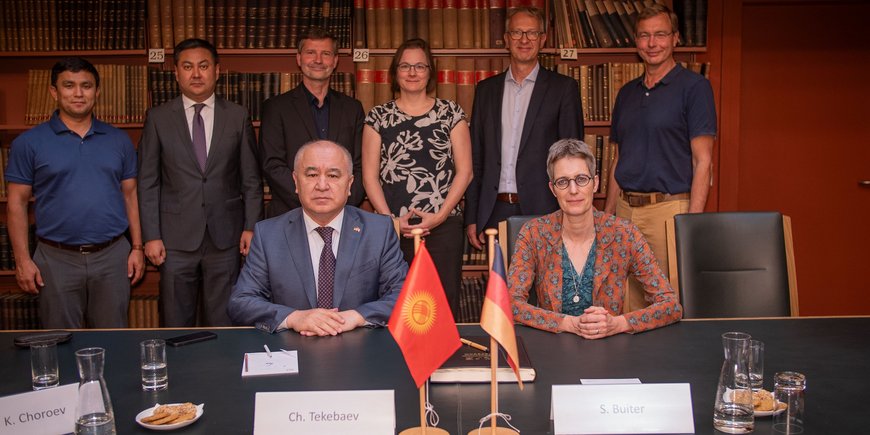Cooperation between German scientific institutions, including the GFZ, and the countries of the Central Asian region is significant and was institutionalized 20 years ago with the founding of the Central Asian Institute for Applied Geosciences (CAIAG) in Bishkek (Kyrgyzstan). The GFZ has been involved in this scientifically relevant region since the 1990s.
There are several reasons for the increased initiative in the Central Asia region*. On the one hand, climate change is progressing particularly strongly in Central Asia and many of its effects are already clearly visible there. Among other things, climate change is leading to changes in the water cycle, glacier retreat, increased glacial lake outbursts and geohazards such as flooding, mudslides and landslides. On the other hand, a wide variety of adaptation strategies to climate change are already being tested in practice in the region, and their effectiveness can be scientifically monitored and investigated.
Furthermore, the large mountains in Central Asia form a unique natural area worldwide. Their protection is an intrinsic value, irrespective of different social interests. The importance of this natural area is of great social significance, particularly for the water supply and the water cycle of the entire region. The numerous glaciers in the Tien Shan, Alai, Altai and Pamir Mountains feed the supply systems downstream. In addition, earthquakes and the associated risks are widespread in these mountains due to the active geodynamics. Due to this great importance, the GFZ operates a "Global Change Observatory" in Central Asia, to which the CAIAG also contributes with its monitoring and information systems.
Declaration of intent to expand cooperation
In order to intensify cooperation between Germany and Kyrgyzstan, the German government and the Kyrgyz Cabinet of Ministers drew up a declaration of intent to expand scientific cooperation in 2023. In particular, the implementation of the Paris Climate Agreement is an important concern for both sides. Subsumed under the umbrella of science diplomacy, the focus is primarily on transnational initiatives, but also on the establishment of joint labs at universities and non-university research institutions and the establishment of (excellence) networks and joint junior research groups.
Thematically, adaptation strategies to climate change are an important part of this declaration and the intention to cooperate in environmental protection and environmental security is also reaffirmed. In this context, projects in the areas of natural hazards, water, energy and land use are to be promoted.
Green Central Asia" project at the GFZ
The "Green Central Asia" project, which is scientifically coordinated by the GFZ among others, is a central anchor point of cooperation. This initiative was launched in 2019 by the Federal Foreign Office and the Central Asian foreign ministers in order to cooperate in the above-mentioned areas. Green Central Asia builds on the long-standing predecessor initiative Central Asian Water (CAWa). Potentially emerging (usage) conflicts, particularly with regard to the availability and use of vital resources such as water, can thus be identified at an early stage and averted through evidence-based decisions. A central concern is therefore to strengthen cross-border cooperation, as many natural cycles extend far beyond national borders.
Green Central Asia also aims to improve access to important environmental information and risk analyses so that the participating countries in Central Asia can better assess the effects of climate change and take effective preventive measures. At the same time, dialogues and workshops are intended to increase the resilience of the partner states and the ability of decision-makers to adequately address security risks resulting from climate change at national and regional level.
The Kyrgyz ambassador visited the GFZ to discuss the progress of this important project with researchers from several specialist areas.
CAIAG │ Further information
CAIAG was founded in 2002 by the GFZ and the Kyrgyz government. CAIAG conducts applied multidisciplinary research on socially relevant topics, especially monitoring and analysis of geodynamics, natural hazards and the associated development of early warning systems to minimize damage. Another central field of activity is studies on the course and intensity of regional change, current development trends and their impact on environmental development. CAIAG strengthens scientific capacities in Central Asia, operates monitoring and information systems and promotes international cooperation. The institute provides knowledge-based support for decision-makers in the Central Asia region (ministries, authorities, NGOs) and trains junior staff.
++++++++++++++++++++++++++++++++++++++++++++++++++++
*Editor's note: Central Asia here comprises the five Central Asian republics of Kazakhstan, Kyrgyzstan, Tajikistan, Turkmenistan and Uzbekistan as well as Mongolia, which are included here as part of an extended definition of Central Asia.












![[Translate to English:] [Translate to English:] Abror Gafurov von dem Schriftzug "Welcome to Azerbaijan" und den UN und COP Logos](/fileadmin/_processed_/2/5/csm_2024_11_Baku_COP29_Abror_Gafurov_1042faec82.jpeg)


![[Translate to English:] Martin Herold standing in front of the library on the Telegrafenberg](/fileadmin/_processed_/c/d/csm_Martin_Herold_d385ee4dd9.jpeg)
![[Translate to English:] Many people are listening to a presentation in the GFZ lecture hall.](/fileadmin/_processed_/c/a/csm_1_Bild1_hell_b9c0e9f5ed.jpeg)






![[Translate to English:] Both scientists sitting on stools in front of a wall of books in the Telegrafenberg library](/fileadmin/_processed_/6/6/csm_Buiter_Castell_DORA_4_e87cb1ea18.jpeg)
![[Translate to English:] Gruppenbild mit 4 Personen](/fileadmin/_processed_/8/d/csm_20241017_GFZ-Emmerman-Medal-005_web_reinhardtundsommer_21a414fa4a.jpeg)






![[Translate to English:] Ice landscape with five red tents](/fileadmin/_processed_/8/9/csm_Zeltlager_auf_dem_Eis_Urheberin_Jenine_McCutcheon_5ced2d523b.jpeg)


